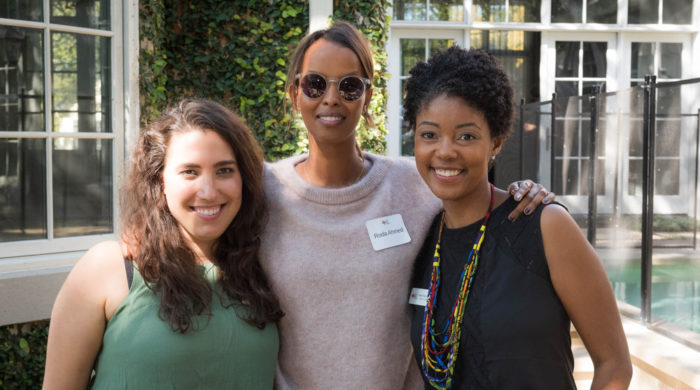The Texas Book Festival launched by former librarian and then First Lady of Texas Laura Bush and philanthropist Mary Margaret Farabee in 1995 continues to grow in size and impact. Today the literary event brings more than three hundred authors to Austin each fall for a weekend of thought-provoking book discussions. What’s more, its book sale proceeds and attendee donations support powerful student programs in schools throughout Texas year-round.
One of those programs is Reading Rock Stars, which sends noted authors into Title I schools to inspire kids with great books and powerful live presentations. To date, the program has facilitated more than 400 author visits to Title I elementary schools in Austin, Dallas, Fort Worth, Houston, and the Rio Grande Valley, and distributed more than 100,000 autographed books to students at those schools.
The newer Real Reads program serves middle and high school students in similar fashion, pairing close readings of urgent books with deep conversations with their authors. Participating authors include Kwame Alexander, Matt Mendez, Jason Reynolds, Erika Sánchez, Nic Stone, Angie Thomas, Jacqueline Woodson.
I recently spoke with Lea Bogner Loy, who, as the outreach manager for the festival from 2017 to 2019 expanded Reading Rock Stars and launched Real Reads. We discussed what separates these programs from other author visits, why kids need to see themselves in books and authors, and what she hopes her Texas Book Festival legacy will be.
What was the most meaningful part of your Reading Rock Stars experience for you?
I think the focus I brought to the program on working with authors of color. I just saw what a difference it made when the students saw an author that looked like them up there. How much they really connected with the book. I also saw how grateful librarians were because they always felt like they struggled so much to find books that related to their kids. And so for me, being able to give a platform to those authors, and also give kids that experience, was really meaningful.
What are some of your favorite Reading Rock Stars memories?
Oh man, so many. There was one in the Rio Grande Valley with Ying Chang Compestine, presenting [her book The Chinese Emperor’s New Clothes] to PreK, K, and 1 students. She was talking about how she was an immigrant and all the kids were saying how they were immigrants too. There was that moment of cross-cultural understanding that was really special.
And there were always moments where kids would say, “I get to keep this book?” or “I’ve never had a book before.” That happened at every school we went to and every time it was always a gut punch. It was a reminder that we were doing important work.
During your tenure, you also launched the Real Reads program for middle and high school students. Why was it important to you to provide author programming for older students?
I think there’s a magic of reading that starts to get lost as you get older, especially for the students who aren’t seeing themselves in books. It’s an issue across the board. I remember being in school thinking “I can’t read The Grapes of Wrath or Shakespeare anymore. I want to read something that’s relevant and interesting to me.”
When you don’t have any reason to get connected to a book, you’re just not going to read as much. And it’s so important to continue to read—not only for vocabulary acquisition or to do well on standardized tests, but to be connected to modern issues.
And so that’s what Real Reads did. It gave students books that were really interesting to them and relevant, but that were also connected to things that they were seeing in the news and dealing with on a personal level. So they were able to really bring it all together and ignite that spark for reading.
I think people, especially literacy programs, have started to write off older students and think that they’re kind of a lost cause by the time they get to high school. And I really disagree with that.
What do you hope your Reading Rock Stars legacy will be?
Legacy is a big question. There are two parts of it. One is you’re just getting kids excited about reading, which so many authors are great about. But I think in publishing and in charity it’s easy to fall into the white savior complex of “I’m going to do these nice things for these kids of color and it’s going to change their lives.” If we’re not more intentional about it, it’s not going to make the kind of impact that it should.
I hope my legacy is that this program is not only about showing kids that reading is fun and important, but that they deserve books and that they’re empowered to do whatever it is they want to in their lives.
When I was in the classroom, the curriculum that was given to me was all about young white boys and 100% of my students were black. It was heartbreaking. Kids deserve to see themselves in books and if I had the platform to be able to bring a book to a child, I wanted to make sure that either it was going to be really funny and make them really love reading or they were going to see themselves in the book and feel empowered and seen.
This interview has been edited for brevity and clarity.

